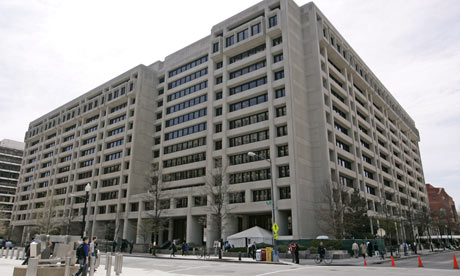International Monetary Fund comments provide clear support for the Bank of England's programme of quantitative easing
- guardian.co.uk, Wednesday 30 September 2009 10.30 BST
- Article history

The International Monetary Fund has warned that the UK's economic recovery will be muted. Photograph: Matthew Cavanaugh/EPA
Highlighting the risk of a £180bn funding gap in 2010, the Fund said there was a "significant tension" between the supply of finance from a weakened banking sector and rising demands for funds, primarily caused by the soaring government deficit.
Jose Vinals, the IMF's financial counsellor, said that despite avoiding a global meltdown, the shortage of credit and the pressures on government finances posed risks to recovery.
Launching the Fund's half-yearly Global Financial Stability Report (GFSR), he said the UK was likely to face "difficulties" in meeting the demand for credit.
"Either there will have to be continuing support on the part of the authorities to underpin the credit process or there will be higher lending interest rates, or credit will be constrained."
The comments provided clear support for the Bank of England's programme of quantitative easing, which is designed to compensate for the inability or unwillingness of banks to lend.
For the first time since the financial crisis began in August 2007, the Fund cut its estimate of the writedowns facing banks and other financial institutions. In the spring it predicted a $4tn bill but has now pared this back to $3.4tn (£2.11tn).
"Over a year has now passed since the Lehman Brothers bankruptcy prompted a potential global financial meltdown", said Vinals. "Fortunately the situation is very different today due to unprecedented policy actions and the overall improvement in economic conditions. We are on the road to recovery, but this does not mean that risks have disappeared."
Vinals added that countries such as Britain, which had high levels of debt in relation to the size of the economy, were particularly vulnerable to higher long-term interest rates because of fears about the sustainability of the public finances.
In August the Bank of England increased the QE budget to £175bn, following a meeting where governor Mervyn King was outvoted in his attempt to raise the ceiling to £200bn. Discussions continue within the Bank on what additional measures - possibly extra quantitative easing or even negative interest rates - it could take in the future.
Although Vinals' comments do not amount to an explicit call for more QE, they do indicate that the IMF would not stand in the way of an enhanced programme by the Bank to increase credit availability.
David Miles, a member of the Bank's monetary policy committee, told a conference in Belfast this morning that QE was having an impact, although it was hard to say how much exactly. Miles added that he saw little reason to proceed particularly cautiously with QE as the policy was "not irreversable".
No comments:
Post a Comment